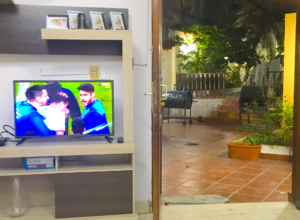In the hubbub over the Women’s World Cup it has been easy to overlook, in the U.S. at least, that there’s been another major soccer tournament underway. I heard about it on a plane to Paraguay. In the only announcement that didn’t have to do with routine matters of timing, altitude or weather, the pilot reported the results of two first-round matches to scattered applause. It’s the Copa America, which pits national teams from South America against one another and which gets close attention across the continent.
My reasons for traveling to Paraguay were several, and too complicated to fully relate here, but a major component was a desire to move my knowledge of Spanish from its long-standing condition in which I knew only the present tense, which I tend to think of as the tiempo turistica. It is much of what you need when what you need to learn is: Where does this bus go? How much does this drink cost? Is the water safe? But like much tourism itself the tiempo turistica is ultimately unsatisfying, unable as it is to convey context, history or depth. That’s why it’s perfect for those who prefer their vacations to emphasize only the sensations of the present moment: the crystalline beach, the cool drinks, the new (but not too new) dish at dinner, the Instagram-worthy snapshots with backdrops of natural beauty or exotic and picturesque buildings. The whole point of such a trip is to revel in the present moment in an almost Buddhist way, with the past and future diminishing in importance. Present tense—exactamente.
But unless you’re a Brazilian crossing the border to stock up on cheap consumer goods, there isn’t much immediate-gratification tourism in Paraguay. In fact, there isn’t much casual tourism at all. I’m staying at a language school-cum-hostel in the capital, Asunción, and the travelers who show up here each have a particular drive far removed from lie-on-the-beach tourism. There are American graduate students gearing up to do ethnographies in remote rural communities; a Brit boning up on his Spanish before he begins a volunteer farming project; a Brazilian tour guide who wants to enhance his business by speaking better Spanish; a young Irishman who decided he had had enough of his apprenticeship as an electrician and two days later landed in South America. They’re not tourists, and they’re not living here in the present tense. They’re focused on the future, not looking for bliss in the moment—nobody who’s studying is.
But of course we have to take breaks, and last week there was a major star-on-the-national-calendar diversion when it came time for Paraguay to play in the Copa quarterfinals, having made it through the initial round. Unfortunately the team’s placement pitted it against Brazil in the quarterfinal. Despite having not done well at the last few Copas or World Cups, Brazil is a perennial powerhouse, the Yankees of South America’s soccer world. It was hosting all the matches, so the Paraguayos had to play before a largely hostile crowd.
The weight of other tenses loomed too. Brazil is vastly larger and more populous than Paraguay, but in 1864 this fact did not deter an overconfident Paraguayan president from declaring war on its neighbor. For good measure, he also declared war on Argentina, the country’s other giant and more populous neighbor. (And on Uruguay too, by the way.) The war was a six-year-long disaster that resulted in the death of an estimated two-thirds of Paraguay’s male population and remains a national sore spot. Couple that with another century and a half of the sort of relationship strains that seem inevitable between a powerful country and its smaller neighbors, and the past felt heavy as the players took to the field. Was that the simple past tense, the imperfect, the past progressive? It was my first week of class. I couldn’t yet answer that question.
The Paraguayans in the room had a largely fatalistic attitude: their players would likely lose, but it was important to support them as a matter of pride. I knew this feeling, having grown up as a Cubs fan. Always there seemed a small chance of success; always this hope was dashed. (This continued until 2016, when, weirdly enough, within a week the Cubs won the World Series and Donald Trump was elected.) How do you say, “I hope we will win, but I fear we won’t”? That too was beyond me. In Spanish as in English, future tenses get complicated, tied up as they are in presumptions about how likely or hoped-for a particular outcome is. So I stuck to the simple: I watch the match. Yes, I would like a beer. Meat grilling outside on the patio: that’s good.
Against my expectations, it was a compelling match. The Brazilians were clearly stronger, dominating possession of the ball more than two-thirds of the time. But even though they were constantly on the attack they couldn’t capitalize on their strength. Sometimes their goal shooting was off; a number of times the Paraguayan goalie—clearly the player of the match—made solid saves, and often, even when they played one player short in the second half due to a foul, the Paraguayos simply played scrappy defense, as they had for much of the 1860s war. At the end of the first half, the score stood at 0-0. At the end of the second half, still 0-0. This was vivid present tense indeed. “Penalty Kicks Baby!” the Paraguayan next to me posted on her Facebook feed. If there was anything that could even the chances, it was the luck of the shootout.
But alas, it is not to be. The Brazilian goalie stops the first Paraguayan shot, and the final Paraguayan shot goes wide. The Brazilians exult. The camera moves in on the player who missed this last chance. He looks crushed. I look up the word: “desconsolado.” As the Brazilian fans celebrate he is embraced by his teammates. I’m sure they say something like what the Wrigleyville Bleacher Bums always did: There’s always next year. It’s always said in the present tense, an expression of hope to provide comfort now rather than any sort of prediction.
There’s always another grammar class in the morning too, another chance to explore the future in a new way. But for this evening there is the satisfying eating of the grilled beef, with somewhat less gusto than we’d hoped, and on the screen the universal expression of grief needing no translation.


